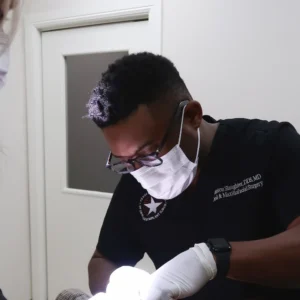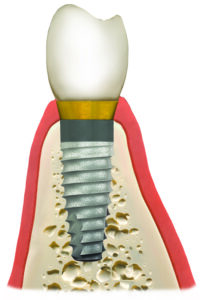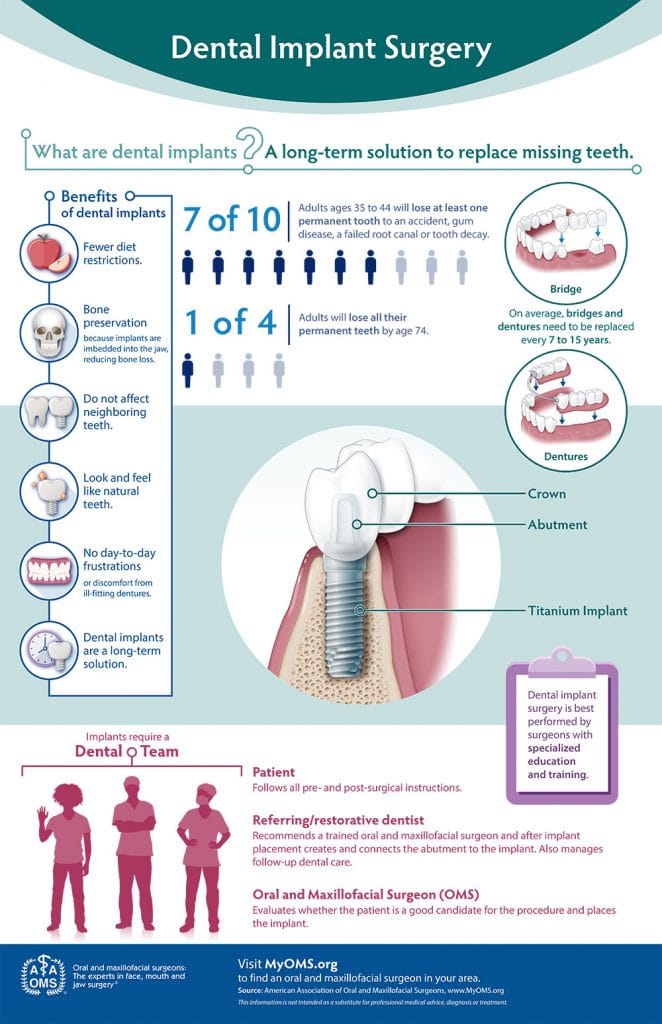Support a Brighter Smile
After losing one or more teeth, finding the right prosthesis to replace them is vital to preserve the long-term health and integrity of your smile (not to mention its appearance). For many patients, the most beneficial option is to replace their lost teeth with dental implants – biocompatible posts that are designed to replicate the form and function of healthy, natural teeth roots. If you’re looking to restore your smile and get your get your bite back, give us a call and schedule your appointment today!

Why Choose Implants?
- They’re incredibly strong and long-lasting.
- They feel just like your natural teeth.
- A full, healthy smile can boost your self-esteem.
- They help to preserve your jawbone and prevent further bone loss.
The Biocompatibility of Your Implants
Dental implants are created with biocompatible titanium, which is what makes it possible for your oral structures to bond with them. After we place your implants, the bone in your dental ridge will fuse to the post as it heals, making it as permanent as a healthy tooth root. With one or more dental implant posts, your custom-made dental prosthesis will more closely replicate the full structures of your healthy, natural teeth.
The Difference Between Implants and Dentures
Traditionally, replacing one or more lost teeth has been the job of conventional bridges and dentures, which are designed to replace the visible, functional parts of your teeth. Dental bridges rely on supportive crowns and abutment teeth, partial dentures rest on custom-made bases and hidden clasps, and full dentures stay in place due to the natural curve of your dental ridge. Dental implants from this because they’re designed to replace the lost roots of your teeth, which makes it possible to support your restoration with the best comfort and stability.
The Advantages of Dental Implants

Because they mimic the functions of your lost tooth root, an implant provides several important benefits for your immediate and long-term oral health. Not only do they support your replacement teeth in a more lifelike manner, but they also help keep your smile strong and healthy by stimulating it every time you bite and chew.
Qualifying for Implant Surgery
Dental implants are a good option for most people who’ve lost one or more teeth, regardless of their age. However, before recommending implant placement, we’ll perform a comprehensive examination using digital imaging equipment, including CT scanning and 3D digital modeling, to ensure that your oral structures are healthy enough for the procedure. You may also require additional treatment if you exhibit signs of periodontal disease or other concerns that might impact the success of your dental implants.
Placing Your Posts
Completing your restoration involves a surgical process that involves strategically implanting an appropriate number of posts to support your dental crown, bridge, or denture. Once the most appropriate position and angle of each implant post are determined, a surgical guide will allow Dr. Slaughter to complete your placement. After making a small incision in your gum tissues and creating a space for the implant post within your dental ridge, we’ll situate the post according to the surgical guide. In some cases, we may recommend placing a temporary restoration over your dental implant posts during the healing process until your implant posts are ready to receive your permanent restoration.
Post-Surgery Care Tips
After your surgery, Dr. Slaughter and his team will provide you with comprehensive post-op instructions to optimize your healing. In addition to these instructions, you can properly care for your implants and restoration by practicing good dental hygiene every day. We recommend using a soft-bristled toothbrush and less abrasive toothpaste to keep your maintenance gentle. You should also schedule and attend routine checkups–these will help you avoid or detect potential problems that could affect them.

Frequently Asked Questions
Am I a good candidate for dental implants?
Most patients who’ve experienced tooth loss qualify for dental implants to replace the roots of their lost teeth. The implant posts are biocompatible, meaning they can bond with virtually anyone’s healthy dental ridge. However, before you can qualify for the implant placement procedure, Dr. Slaughter will ensure that your smile is free of health complications.
Will my insurance cover the procedure?
While dental insurance may cover some of your dental implant procedures, the amount of coverage and eligibility for it varies greatly. Speak with your insurance company if you aren’t sure, and be sure to call our office to speak with our team if you have any additional questions.
Can I get implants for my current restoration?
Dental implants are popular for patients who’ve recently lost teeth, especially for their ability to help you retain your healthy oral structures. If it’s been a while since you’ve experienced tooth loss and you already rely on a dental bridge or denture, then we’ll examine your oral health to ensure that upgrading to dental implants is a good idea.
How long will the procedure take?
What makes dental implants so advanced as a tooth replacement option is their ability to replace your lost teeth roots. To do this, implants must be placed so that the bone structure can fuse to the implant posts. This process, known as osseointegration, can take an average of 3-6 months, and your permanent restoration can be affixed to the implant posts and abutments once the healing process is complete.
Rebuild Your Smile with Dental Implants
Dental implants can transform your smile! By securely anchoring your dental prostheses, we can create a beautiful, natural-looking smile that feels as good as it looks. Whether you’re in Dallas, Mansfield, Cedar Hill, Duncanville, Desoto, Red Oak, Waxahachie, Fort Worth, or any nearby community, we’re here to help. To schedule your consultation for dental implants in Midlothian, call our team today.




 1741 N. Hwy 67, Suite 100, Midlothian, TX 76065
1741 N. Hwy 67, Suite 100, Midlothian, TX 76065 469-649-8259
469-649-8259 469-649-8256
469-649-8256